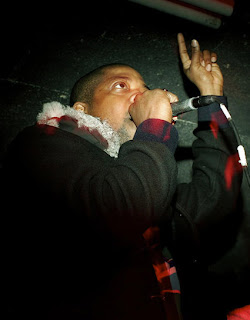"It's the ind of the worl, baby, so let's have fun"
Alright, once I crank this one out, I'll be half way to being caught up. While KVCU has been giving me new albums every week, I haven't gotten any hip-hop until last week when I picked up Camu Tao's "King of Hearts." I was skeptical because I'm pretty picky about my hip-hop and am very critical of what is and isn't good hip-hop. When I played "King of Hearts," it was definitely something different, not exactly what I was used to. While some tracks do have that typical hip-hop feel, other songs definitely seemed to stray towards a more punk-pop feel. "Be a Big Girl," the albums opening track, in particular has Tao singing rather than rapping and has a very bubbly, upbeat, synthesized beat. Since this is the overwhelming feel for a majority of the album I started to get worried that I wasn't going to get a genuine hip-hop album. Just as I was thinking that, along came "Ind of the Worl," a track that not only has a powerful bass line, but also has some impressive rapping skills as well as lyrics. Now while these tracks are seemingly sparse on the album as a whole, when they do pop up they're impressive. "Major Team" manages to carry a bit of grunge into the album to balance out the pop feel with some quickly spit lyrics and a very swanky beat which really helps to round out the album.

Right as I was about to finish "King of Hearts" I ran into the last track on the album "Kill Me." Now, up until this point I had a feeling that something was bit off about the album as a whole; something about it felt unfinished. With "Kill Me" my suspicions were nothing but proven. The track consists of a capella rapping and singing, all of which sounds really disorganized and mindless. Certain parts sound like a jam session of voices, most of which have little to no harmonizing abilities and are incredibly off key; I was prepared to tare this song a new one. However, had I not been a part of KVCU and was forced to do my research for their reviews, I would not have found out one crucial fact about this album. After two years of battling lung cancer, Camu Tao passed away on May 25th, 2008. The album was originally supposed to be released last year, but was postponed until August 17, 2010. After Tao's death, several collaborators and friends made an attempt at finishing the album, but without Tao's insight, didn't want to change anything they were uncertain about. Collaborator and friend El-P says that while some “songs are bare… a lot of them are just what he wanted.” This respect for Tao by his collaborators is what produced "Kill Me." With this knowledge and listening to the track again, there's a certain rawness that really draws you in; its almost as if you're listening to a ghost, unable to really know what the track was originally meant to be, only exposed to the nakedness of the song.
"King of Hearts" will definitely take new listeners a few times through to get used to Camu Tao's style. The way he merges pop-punk with hip-hop is interesting to say the least. However, in taking this direction he creates a multitude of unique and interesting sounds. After having read up on his death, it is clear that Camu Tao inspired and touched several other people in the music industry. He certainly will not be forgotten in the music world and with a track like "Kill Me" really heightens the awareness of our own mortality, but also that of the artists we listen to on a day-to-day basis. Take a listen here.














